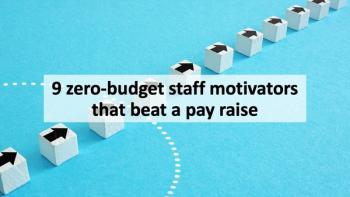
Using Pinterest to Market Your Medical Practice
Pinterest is quickly becoming the next big social media outlet, so here's an easy guide on how your practice can get online and connect with patients.
By now you’re likely familiar with Facebook and Twitter. The latest form of social media that could have huge implications for how you market your medical practice is Pinterest. At Insight Psychological Centers in Chicago,
Pinterest is one of the fastest growing social networks with nearly 12 million unique monthly visitors in January 2012. It’s an online bulletin board that lets you create theme-based boards around your events, interests, hobbies and more. People have used Pinterest to plan their weddings, share their favorite recipes, decorate imaginary houses, and showcase their style. Last summer, Time magazine listed Pinterest in its “50 Best Websites of 2011” article.
A Pinterest page consists of multiple pinboards organized by category. Common categories are titled “Inspirational,” “Recommended Reading” and "In the News" and you "pin" items of interest to your patients as visual representations of websites, articles, etc. that are of interest.
You can create pinboards focused on your practice and browse those created by others. When you see something you like - either online or an item another person has pinned - you can repin it to your board, essentially adding it to your own "homepage." You can also upload items that come across your desk. For example, a recent cover of Newsweek promoted a story on obesity in America (May 14, 2012). We pinned the image of the cover from the Internet to our Pinterest page, linking the reader back to the article.
You can then “share” these pins through your practice's Facebook page or Twitter account, broadening your reach.
People who are interested in your area of expertise can choose to “follow” you. That means that every time you “pin” new content to your site, it will show up in the newsfeeds of your followers. But patients can access your Pinterest page at any time to find information or inspiration - without actually following you.
At Insight, we provide services to patients with eating disorders including binge eating. Many of our patients are young and female - a population that’s already drawn to Pinterest. In fact, most of Pinterest’s users are female, with 97 percent of the site’s Facebook “likes” made by women.
We already have an online presence in other social media, including a Facebook fan page and a Twitter account. These forms of social media still have a place in our marketing plan, but we feel the visual nature of Pinterest makes it a very engaging medium well-suited to our audience of young women.
Pinterest holds many benefits for medical practices looking to market themselves.
Control your online message
Our goal is to create a safe place online for our past, current, and future patients. We want to share healthy and positive messages about body image. The Internet can hold such inaccurate, skewed health information, especially about body image. Patients and their families can feel confident that our content has been approved by medical professionals.
Maintain dialogue with your patients
Pinterest is a highly effective way to maintain dialogue with your patients. In terms of eating disorders, recovery is such a long process. Even when treatment ends, patients can still feel connected to us and share that connection with others. For example, patients like to share inspirational sayings with others. They can repin the image onto their own boards and some even print out the message and display it in their home or office.
Link your audience to relevant health information
With Pinterest, you’re not limited to content that’s visual in nature. You have the ability to link back to relevant and reliable health information. By clicking on one of our boards, people link back to professional eating disorder organizations, educational advocacy groups, recommended readings, and relevant news items. Everything you pin is visual in nature, whether it’s a book cover, logo for an organization, and so forth.
Create boards that reflect your practice
At Insight we have a body image board, with different body types to remind people that all bodies are beautiful. We’ve also created boards with inspirational messages, healthy recipes, suggestions for healthy activities like visiting the farmer’s market or a museum, and even fun things like pictures of kittens and puppies. Treatment can feel so heavy at times.
Nearly any medical practice can benefit from Pinterest’s visual nature. You need to target your boards to your patient base, of course. An OB/GYN practice might consider boards that feature healthy eating tips, exercises for pregnant women, a month-by-month guide to their baby’s development, cute baby rooms, maternity fashions, or the latest celebrities who are pregnant. A sports medicine practice could have a board of high-profile athletes who suffered injuries, tips for stretching and warm up, and the newest fitness equipment. The possibilities for plastic surgeons, pediatricians and others are endless.
No cost and low time commitment
There’s virtually no cost to establishing a Pinterest site. It also requires very little time to update your page’s content regularly. You can assign this task to someone in your office or do it yourself. Whenever you come across something interesting, you can either repin it or upload it. It’s that easy.
We’ve had an enthusiastic response from our patients and have been steadily gaining followers. Only time will tell what impact Pinterest has on our practice. But we’re certain we’re communicating the message we want, where we know we’ll find our patients.
Jenny Conviser, PsyD, is co-director of
Newsletter
Optimize your practice with the Physicians Practice newsletter, offering management pearls, leadership tips, and business strategies tailored for practice administrators and physicians of any specialty.








